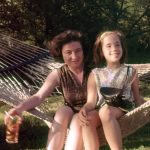
My mother and I had a somewhat fraught relationship. She was beautiful and smart and funny, and troubled (I have entirely unscientifically diagnosed an anxiety-depression disorder with a touch of OCD), and as the only girl in the family I was “hers” in the way that my brother was my father’s. Which is not to say that my Dad and I weren’t close–it was more that I was the person she reached for–and as my parents’ relationship foundered, she reached for me a lot.
Flash forward: I’m an adult and I have kids, and our goal, my husband’s and mine, was to Make New Mistakes. On the theory that making mistakes while raising children is unavoidable, even with all the love in the world. Goals are great, but not always achievable. So how did we not replicate the same unintended mistakes our parents (and in particular my mother) made?
The flippant-but-hot-untrue answer: a good deal of pre-children therapy on both our parts. But equally true: I was lucky enough to find a succession of not-mothers, women who modeled adult womanhood for me in an un-fraught way, and welcomed me to it. (I should note that several of my not-mothers had prickly relationships with their own daughters; it’s quite possible that my relationships with them was as important as their relationships with me, but that never came up, so I could be inventing things.)
Two of my not-mothers were librarians. The first was Emilie Rutledge, the librarian at my high school. I arrived there at the beginning of 9th grade, as out-of-water a fish as you could imagine, moving from the city to the country, from a liberal private school to a fairly conservative public school. Also, if you look up socially awkward in the dictionary you will find my photo. Mrs. Rutledge somehow saw me (or maybe it was just the dozen books I’d check out at a time) and by the time I was in 10th grade I was a library aide, shelving books and checking books out. When I started looking for colleges, she suggested one I’d never heard of–Connecticut College, her own alma mater. It’s where I wound up going to school, and it was perfect for me, and to this day I thank Mrs. Rutledge for her kindness.
At Connecticut College I got a work-study job in the library. For the first year I shelved books and filed catalog cards (yes, I’m old enough to remember catalog cards in a deeply personal way). But my sophomore year I found myself working in the basement in “Book Prep,” where new books were prepped to be shelved, and hurt books were repaired. This was not archival repair–more like scotch-taping a torn page or putting a new mylar cover on a dust jacket–but under the aegis of Bernice Radliff I learned to do all these things and more. Bernice was the wife of a former Navy man, and a secret radical–she couldn’t talk about her politics at home, so we talked politics at the library, Bernice, her other assistant, Lindsay, and me. We talked politics and family and ideas and… just talked. It was clear that she adored her husband, however far apart politically they were, and that he adored her. This was a novel experience for me–I knew there were happy marriages out there, but I had no idea how they were achieved or what compromises were involved. That’s one of the things I learned from Bernice. And she believed in me, or perhaps, in the adult I would be, apart from her, on my own.
At about the same time, in the summers, I was an au pair for a family in Westchester. I met the mother of the family, Anne, when she and a friend stayed with my family–she was looking for a property to buy in our area. And for reasons, Anne and I hit it off, so much so that just as I was looking for a summer job between high school and college, she called to offer me one, looking after her youngest son for the summer. There were five children, ranging in age from the youngest, who was eight, to the eldest, who was my age. These people had significant wealth–the first summer I worked there I was picked up and brought down to their house in the company helicopter–and it was difficult not to feel a little like Jane Eyre. Except that Adam, the little boy I took care of, and I came to adore each other–and that Anne and I forged a relationship that was, in many ways, a breath of fresh air for both of us. She wasn’t my mother, I wasn’t her daughter, but there was something about the way we interacted that was mother-daughterly. I carry a bit of that with me in dealing with my own daughters, and I thank her every day.
When my daughters were growing up I hoped they would find not-mothers to expand their idea of what their relationships with older women–as mentors, as friends, as teachers–could be. I didn’t inquire–part of the importance of a not-mother is that she belongs to the child, not the parent. If it takes a Village to raise a daughter, not-mothers are at the forefront of that township, and I am deeply grateful to mine.

This seems like a very good idea. Thinking back to my youth, I can’t think of any women who really filled that role for me and that feels like a lack.